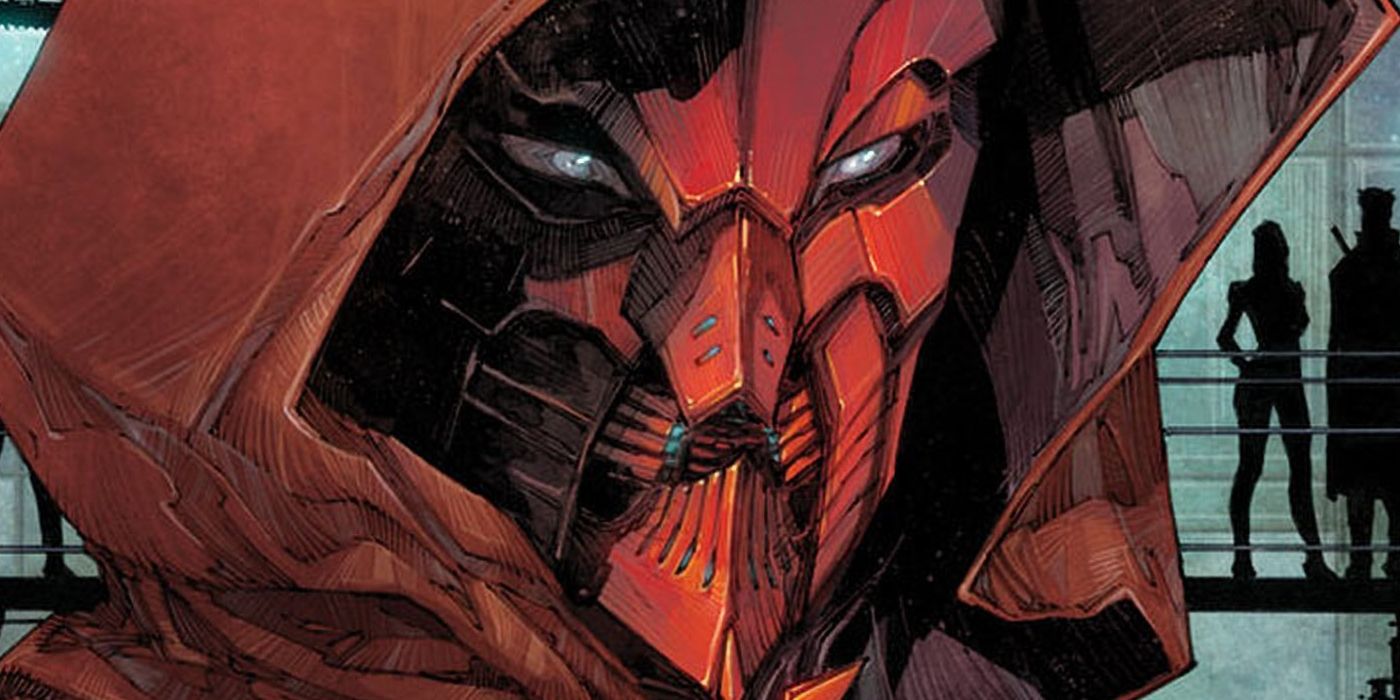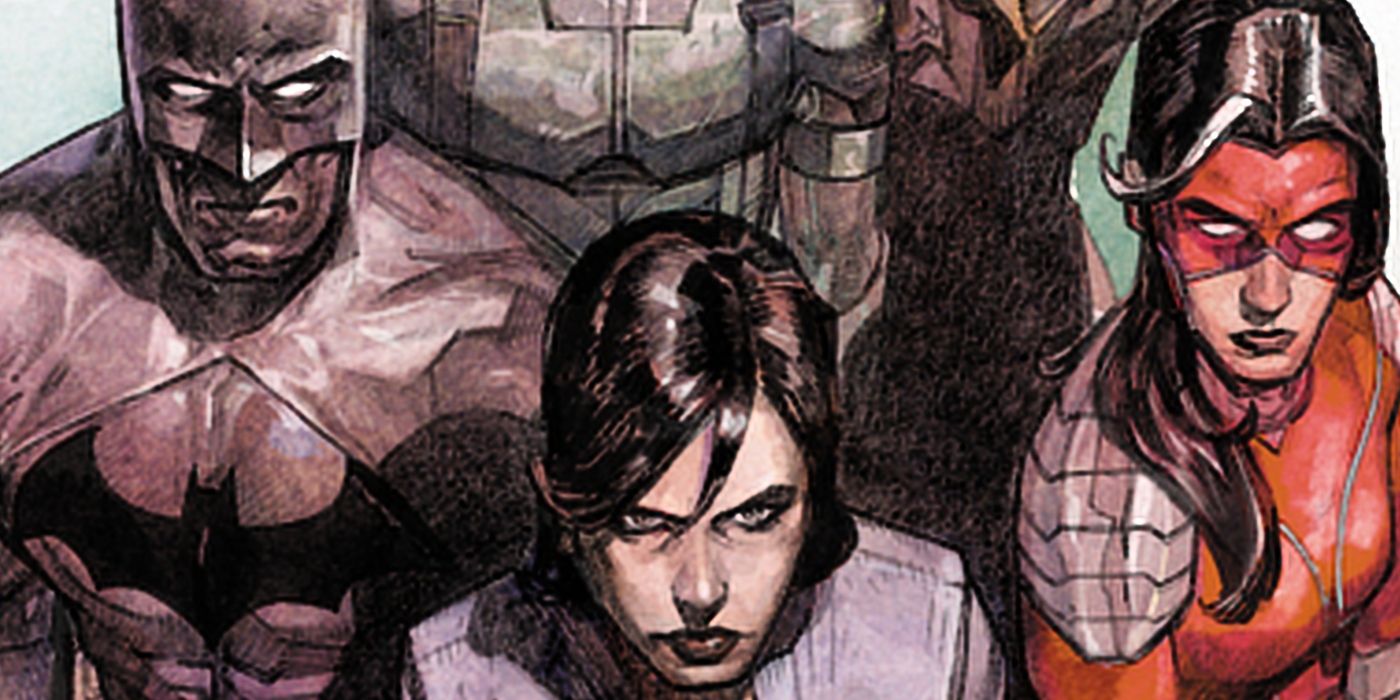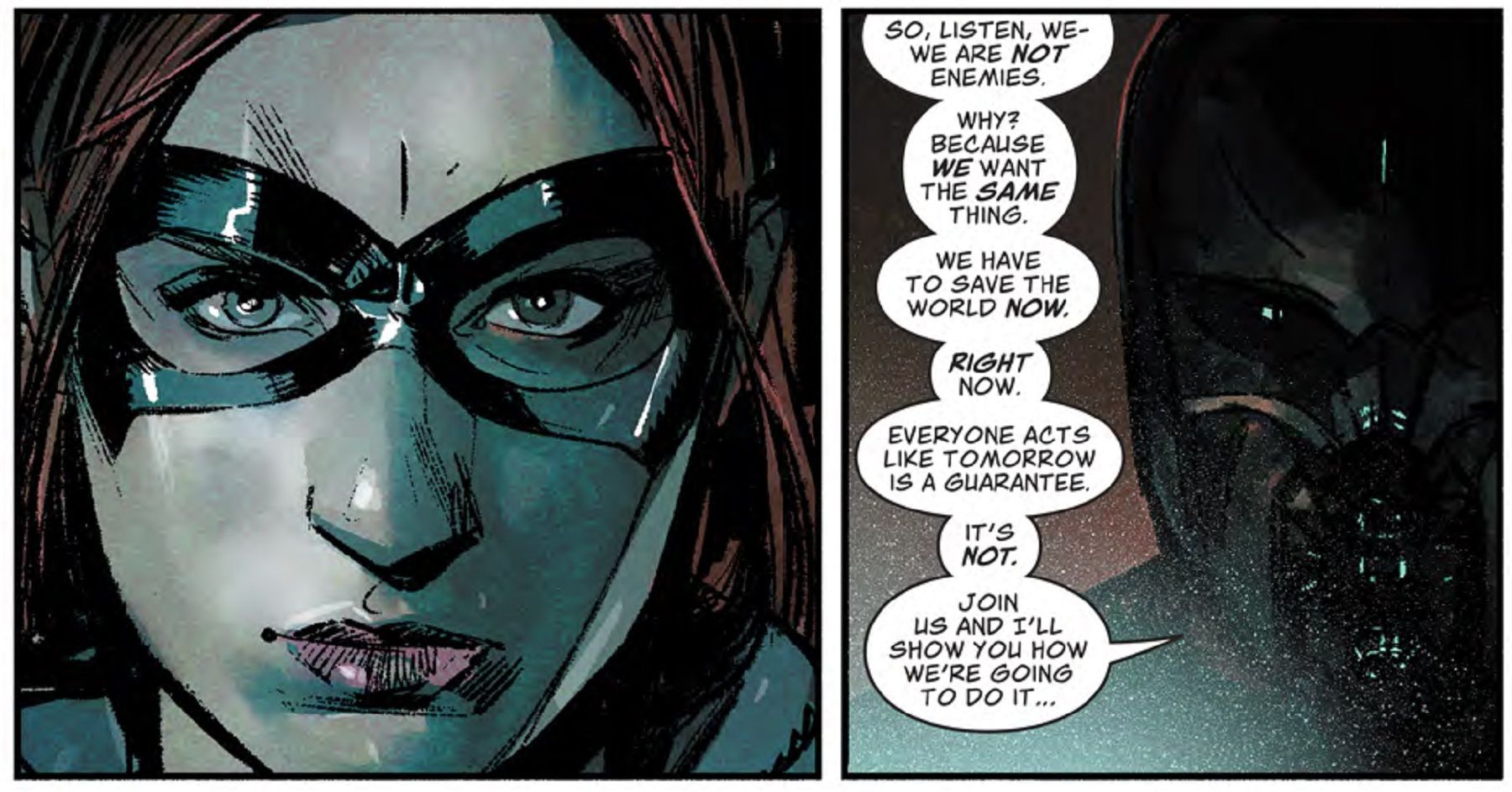DC's Event Leviathan has arrived, and the storyline is set to restructure the DC Universe. The Brian Michael Bendis-written story follows a team of detectives working together to try and solve the mystery of what the mysterious group known as Leviathan, which we first met in Grant Morrison's Batman run, really wants for the world.
During a roundtable discussion with the media, ahead of the event's arrival, Bendis revealed the origins of the storyline, the reason Leviathan's agents look they way they do, and how this is different from other major DC stories.
The seeds of the idea that became Event Leviathan were sown in one of the very earliest meetings Bendis had with DC. "On my very first sit down with [Co-Publisher] Dan DiDio here in Burbank, when we were just thinking about [whether] I would rip up my whole life and come to DC Comics, we were just talking about the stories we could tell the things we could do... and he said, 'What I've really been thinking about a lot of is the redundant organizations in the DC Universe. They were all created in good spirit, but now when a new writer comes in, it's just like there a lot of them. So I feel like there's a story where they all get cleaned up.' And I was like, 'Oh, I'm on it. I want it.' I spent like the first six months at DC literally doing my hardcore research, going back from the earliest days of Checkmate to all the way up to here... crafting a mystery story.
"I also knew that this would be Alex Maleev's DC return, and Alex really wants to draw Batman. As much as he really wanted to draw Daredevil and all the other things we've done, he's just been waiting for Batman," Bendis continued. "I knew that, and I knew that whatever story we were going to tell, I was going to make sure it [reflected] his talent and his world view and, boy, he brought it. You saw it. Detective Comics #1000 was like the opening sketch, to shake out the Batman sillies. I knew going in, what I'll do is really structure the story around his strengths and his shadows, and what it ended up being was more along the lines of a Agatha Christie novel, or Death Trap starring DC heroes."
"It's a whodunit, it's a thriller, and the reason I bring that up is because so many event miniseries have almost a disaster movie structure, and I've done them. I'm responsible for some of that," the writer admitted. "In this one, we thought, 'Let's get a little more Batman, a little more detective. Lets show up after it's happened and try to figure it out.' Also, we have a story where almost everyone in DC is a suspect. It could be anybody. So the greatest detectives have to come together and solve that case before the morning, because in the morning something else is going to happen. I thought, this is the kind of book I'd buy.
Of course, any successful event has some lasting, greater ramifications that extend beyond the pages of its own story, and Event Leviathan is designed to do just that. "The structure of the DC Universe... is going to be totally different at the end of the story. Leviathan will have risen, and what it is and what they've done will have landed. A lot of pieces are going to shift, and a lot of heroes are going to have kind of a new purpose, like a new motivation because the enemy will have revealed themselves... Leviathan isn't selling villainy, and he's not sending antagonism. There's heroes and there's villains right now, and there's this other thing -- and this other thing isn't playing by the rules dictated by the the genre. And that's going to mess up a bunch of people's heads. That will have to unfold, but he's not... you know how Magneto, when he tells you his point and you go, 'Yeah, that's a good point, everything you're doing about it is wrong?' I feel like those are the best villains. The ones where you can totally see where they're coming from. Leviathan is 100% in that category. What he's pitching them, he's right. His Batgirl pitch? He's not wrong."
While things may sound bleak for the DC Universe and its heroes, Bendis promises it's not all doom and gloom. "In the middle, there's a little sunshine," he said. "I'm all about juxtaposition. Issue #3 takes place in the Fortress of Solitude, so it's blue and white and shadowy... there will be a reveal or two or three at the end of the issue. Detectives may solve a case, and that case might bring another question to the table. It's a detective book. So a detective will be successful. By the end of this series, you'll find out who Leviathan is, what they've done, why they've done it and what that shape will be coming out of this. and that's what I think people are interested in. Who is Leviathan, and what will the heroes be able to do coming out of this to counter it."
Looking at Leviathan and the design of the titular bad guy, Bendis explained that it was important for him -- or her -- to stand out, which is no easy feat in a universe overflowing with distinctive, world-famous heroes and villains. "This is a character dealing with icons and the psychology of imagery specifically. This is a character of Darth Vader, and what images do to people and how people respond to them. That face, it looks scary to some people and not scary to other people. It's designed that way, there's a psychology to it. When we were talking about just how spy organizations relate to each other now versus how they did back in the day, there's a lot of stuff in this that's going to reflect a more modern sensibility than you may have seen in the past, with people wearing the white carnation or dropping off the envelope... there was a ton of designs. The hardcover will be full of cool choices and stuff. We've literally been trying to do stuff we haven't seen before or done before, but still relates to how people perceive certain things, or sometimes it's this character messing with people's perceptions of how they see certain things. That we'll dig into more in issues #4 and #5. They think they're fighting Darth Vader, because [Leviathan] wants them to think they're fighting Darth Vader.
"Other DC writers have been texting me about this. I'll even say, Steve Orlando has found some really fascinating stuff that I would not have found myself. So I'm always like 'thank you.' But that's what a shared universe is supposed to be, to bring out the best in each other. 'But what about that, but what about that?!" That is big time happening. And it's exciting because I pitched it to the room and all the writers here at DC and it went over well. It was my first thing, and it was weird to pitch to Geoff Johns that we're blowing up ARGUS. Sorry. That was the first thing that came out of my mouth. But everyone really enjoyed it. Not as much as everyone was into Chaz. Chaz played much bigger in the room... Chaz is the best thing I've brought to DC Comics. Nothing you say will convince me otherwise."



